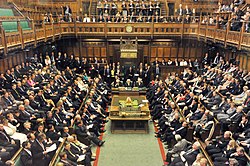No, I am not doing an article bashing the Conservative Party, or at least not with that as the sole focus. Instead I wanted to cover some of the oddities of Parliament that stem from tradition rather than any reasoned process. As such, here are some of the weirder parliamentary anachronisms that we can see today.

Minimalist Architecture
In somewhere like the Palace of Westminster, it is hard to believe that the phrase “minimalist” could accurately apply to any part of the building. Nevertheless, the heart of our democracy, the debate chamber in the House of Commons, is woefully undersized.
At the moment the UK has 650 elected Members of Parliament. Some of those do not take their seats, so the actual number of active MPs is a little below that, but the capacity of the debate chamber is well below that level, around 427 seats. This is why many of the well-attended debates see Members cramming into the chamber, with a significant number of elected officials reduced to standing to watch the proceedings.
Oath of Allegiance
I mentioned above that some seats are not filled at all. This is mostly due to the fact that the elected representatives of Sinn Fein do not take their seats, entirely because they will not swear the oath of allegiance. This is wholly understandable, as the oath is a personal declaration of intent to follow the orders of the monarch of the UK, while the whole purpose of Sinn Fein as a political entity is to separate Northern Ireland from the UK. Such an oath would directly contradict their party’s stance, so they refuse.
Incidentally, it is not possible for an MP to either draw their salary or speak and vote in debates until they swear the oath, so that means that the current system specifically excludes representation for anti-monarchists.
The Mace
If you see a large ceremonial mace in front of the Speaker’s chair and wonder “what is that for?”, this is the section for you. This isn’t a table decoration or a paper weight, instead it is the symbol of the Crown in Parliament. By tradition, the monarch is not allowed to set foot in the House of Commons, so instead the Mace is present. Bizarrely, this means that any debates or decisions made without the Mace being present are not valid and will not be recorded in official proceedings.
When Parliament is prorogued (brought to a temporary close) the Mace is removed, symbolically withdrawing the authority of the Commons to make any decisions. The Mace is returned at the Opening of Parliament.
Member Behaviour
One of the odder things about Parliamentary process is the way that MPs refer to one another. In short, naming another MP is taboo. Addressing another MP directly is likewise not permitted. Instead all comments are made to the Speaker and any referrals to active MPs is made by referencing their constituency (e.g. the Member for Uxbridge and South Ruislip). This is intended to increase the decorum of debate by stopping MPs from outright insulting one another, but I think it’s fair to conclude that Prime Minister’s Questions demonstrates that the quality of debate is woeful.
Voting
At the cry of “Division” by the Speaker, the Commons officially enters a closed state for voting for a motion. This is a literal reference, in that the lobby doors used to be physically locked to ensure that MPs didn’t vote multiple times or that outsiders weren’t called in to cast a vote they shouldn’t have.
You might think that in this modern era of connectivity, there would be a move towards using that for votes so that more business could be done. Sadly not, the division is still counted by the MPs present physically walking through one of two side lobbies, casting their vote by tapping their membership card onto a scanner (a recent upgrade to each corridor having its own set of counters who would report back after a manual count).
This is one of the more egregious anachronisms for various reasons. First, it is not particularly friendly to disabled MPs or those dealing with a new child to force them to physically move through a voting lobby. Secondly, it is grossly unfair to restrict MPs who cannot be in Westminster from voting. This is less of a problem for a London constituency as it is for one of the outer Scottish regions, which might be seven or eight hours away from Parliament.
This is an area which could easily be modernised for the good of the country. A modern electronic voting system would be very simple to set up, and would reduce the time needed for divisions from 20 minutes or so to under a minute. With an app-based voting system and biometric protection, MPs would be able to cast their vote from anywhere in the world, allowing them to spend more time in their constituencies.
